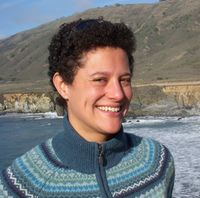Can Algorithms Bend the Arc Toward Justice? - Speakers
From Santa Fe Institute Events Wiki
| Navigation |
Keynote Speakers and Moderators
Day 1
Cesar Hidalgo is the Director of the Center for Collective Learning at the Artificial and Natural Intelligence Institute (ANITI) of the University of Toulouse. He is also an Honorary Professor at the University of Manchester and a Visiting Professor at Harvard's School of Engineering and Applied Sciences. He is known for his contributions to economic complexity, data visualization, and applied artificial intelligence.
Melanie M. Moses is a Professor in the Department of Computer Science with a secondary appointment in the Department of Biology at the University of New Mexico as well as an External Faculty of The Santa Fe Institute. Her research focuses on how complex systems evolve, what makes them efficient, scalable and robust, and why they fail.
Chris Gilliard is a Research Fellow with the Technology and Social Change Research Project at Harvard Kennedy School’s Shorenstein Center. He thinks deeply about surveillance, privacy, tech & data in education.
Adam Omar Hosein is an Associate Professor of Philosophy and Affiliate Professor of Law at Northeastern and currently a Fellow-in-Residence at the Safra Center for Ethics at Harvard University. He works mainly in moral, political, and legal philosophy, with a special interest in areas of international concern and issues relating to race or gender and while in residence he aims to provide a moral theory of discrimination and contribute to debates around, for instance, racial profiling, disability accommodations in the workplace, and gendered dress and grooming codes.
Mahzarin Banaji is a Richard Clarke Cabot Professor of Social Ethics in the Department of Psychology at Harvard University while also serving as the first Carol K. Pforzheimer Professor at the Radcliffe Institute for Advanced Study, and as the George A. and Helen Dunham Cowan Chair in Human Dynamics at the Santa Fe Institute. Her research focuses on the origins of social cognition and applications of implicit cognition to improve individual decisions and organizational policies.
Aylin Caliskan is an Assistant Professor in the Information School at the University of Washington and a Nonresident Fellow in Governance at Brookings. Her research interests lie in artificial intelligence (AI) ethics, AI bias, computer vision, natural language processing, and machine learning and she studies the impact of machine intelligence on society, especially threats to equity. She investigates the reasonings behind biased AI representations and decisions by developing theoretically grounded statistical methods that uncover and quantify human-like biases learned by machines.
Mirta Galesic is a Professor at the Santa Fe Institute, External Faculty at the Complexity Science Hub in Vienna, Austria and at the Vermont Complex Systems Center, UVM. She is also an Associate Researcher at the Harding Center for Risk Literacy and a non-resident system thinking expert at the United States Institute of Peace. Her research focuses on developing empirically grounded computational models of social judgments, social learning, collective problem solving, and opinion dynamics.
Day 2
Tina Eliassi-Rad is a Professor of Computer Science at Northeastern University, Core Faculty member at Northeastern's Network Science Institute and the Institute for Experiential AI, and a External Faculty of The Santa Fe Institute and The Vermont Complex Systems Center. Her research is at the intersection of data mining, machine learning, and network science.
Melanie Mitchell is the Davis Professor of Complexity at the Santa Fe Institute. Her research focuses on conceptual abstraction, analogy-making, and visual recognition in AI systems.
Michael Kearns is a Professor in the Computer and Information Science Department at the University of Pennsylvania, where he holds the National Center Chair with secondary appointments in the department of Economics, and in the departments of Statistics and Data Science and Operations, Information and Decisions (OID) in the Wharton School. His research interests include topics in machine learning, algorithmic game theory and microeconomics, computational social science, and quantitative finance and algorithmic trading.
Cris Moore is a Professor at the Santa Fe Institute. His research involves finding underlying patterns in problems at the interface of physics, computer science, and mathematics, such as phase transitions in statistical inference and search and optimization problems, where problems suddenly become unsolvable due to noise and/or constraints.
Moon Duchin is a Professor of Mathematics and Director of Science, Technology, and Society Program at Tufts University. Her research is in geometric group theory and geometric topology, with tools from dynamics and since 2016 she has been deeply involved in studying the mathematics of redistricting.
Donald Martin Jr. is a Sr. Staff Technical Program Manager and Social Impact Technology Strategist at Google. His focus is on driving equitable innovation in the spaces where products and services intersect with society and understanding the linkages between Trust and Safety, Machine Learning (ML) Fairness and ethical Artificial Intelligence (AI).
Day 3
Suresh Venkatasubramanian is a Research Professor of Computer Science and Data Science at Brown University and currently on deputation in the Biden Administration, serving as Assistant Director for Science and Justice in the White House Office of Science and Technology Policy. His background is in algorithms and computational geometry, as well as data mining and machine learning and is currently investigating algorithmic fairness, and more generally the impact of automated decision-making systems in society.
Sonia M. Gipson Rankin is an Associate Professor in the School of Law at the University of New Mexico. She teaches in the fields of Torts, Family Law, Technology and Law, and Race and Law. Her work focuses on two areas: 1. Race, technology, and law; and 2. Black family and community empowerment, which include topics such as AI, kinship care, criminal justice reform, implicit bias, inclusive leadership, and Black community empowerment.
April G. Dawson is a Professor of Law and the Associate Dean of Technology and Innovation at North Carolina Central University School of Law. Professor Dawson’s current areas of research, writing, and speaking include legal pedagogy, the use of technology in legal education, and Law and Technology.
Nadiyah J. Humber is an Associate Professor of Law at the University of Connecticut and teaches courses in property law, race and the law, housing law, and consumer protection. Her research examines the intersection of civil rights legislation and emerging technologies. She explores how artificial intelligence operates within property and financial service industries, and how these technology tools affect marginalized people and communities.
Alfred Dennis Mathewson is an Emeritus Professor of Law and former Co-Dean of the University of New Mexico School of Law. He has taught primarily courses in business and sports law. He has published numerous articles and given speeches in these areas and he brings this expertise to his teaching.
Kathy Powers is an Associate Professor of Political Science at the University of New Mexico. She is interested in the nature of institutional authority as well as institutional change and effects. Much of her present research focuses on the design of international institutions and law with respect to human rights, restorative justice, trade, and war.




















